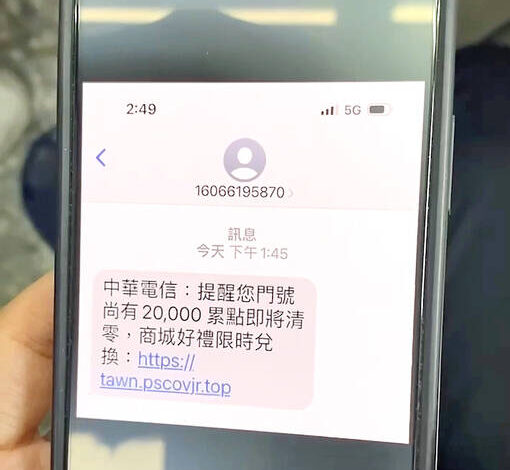Telecoms to watch for mass texts, NCC says

-
By Shelley Shan / Staff reporter
Regulatory changes mean that telecoms are required to monitor people who send more than 50 text message a day and check the purpose of such activity, the National Communications Commission said this week.
The commission in June last year updated its Guidelines for Risk Management Mechanism for Telecom Businesses to Accept Telecommunications Services Application (電信事業受理申辦電信服務風險管理機制指引) as part of government efforts to deter telephone scams, in particular taking aim at the practice of acquiring multiple phone numbers, which makes tracking down fraudsters more difficult.
Changes to the guidelines require telecoms to get two forms of ID from people who apply for services.
Photo copied by Huang Liang-chieh, Taipei Times
This year, the commission promulgated the Management Measures for Telecommunication Service User Numbers (電信事業用戶號碼使用管理辦法) to ensure that telecoms properly manage the phone numbers they control.
The commission recently revised the regulations to reinforce rules for text messages.
Scammers often send a lot of text messages that contain suspicious links, the commission said.
People who open the links could unknowingly have malware installed on their device that turns them into a hub that sends more scam messages, it said.
The new rules require telecoms to adopt risk management measures for non-commercial short message services (SMS).
If the number of short messages sent by a regular user exceeds reasonable expectations, telecoms should activate the mechanism to immediately restrict access to SMS functions, the rules say.
Telecoms estimate that people send at most 50 messages per day, so the guidelines make that a reference by which telecoms can determine when to scrutinize activity, they say.
However, there is some leniency in the rules.
If a “whitelist customer” — whose access to telecom services has never been restricted by judicial authorities — sends more than 50 text messages a day, a telecom can slightly increase the cap for them, after assessing the risk, the rules say.
However, for those who exceed the cap and have faced judicial penalties, telecoms should inquire about the purpose of sending a lot of text messages and review the information, they say.
Telecoms should determine whether the user’s device has been hijacked to forward scam messages, they say.
Telecoms can turn off SMS functions if they detect abnormal or illegal activity, the commission said, adding that operators must update their contracts to explain the SMS limits.
Comments will be moderated. Keep comments relevant to the article. Remarks containing abusive and obscene language, personal attacks of any kind or promotion will be removed and the user banned. Final decision will be at the discretion of the Taipei Times.



